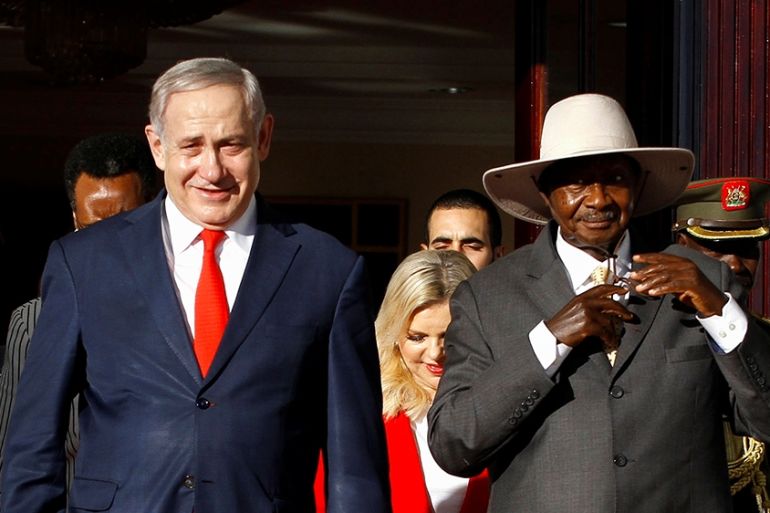Netanyahu says Israel and Sudan to normalise ties soon
Palestinians denounce Israel-Sudan meeting as ‘stab in the back’ that hurts efforts to oppose Trump’s Middle East plan.

Israel and Sudan have agreed to move towards forging normal relations for the first time, Israeli officials said on Monday, after the leaders of the two countries met in Uganda.
Israeli Prime Minister Benjamin Netanyahu held talks with Abdel Fattah al-Burhan, head of Sudan’s sovereign council, in Entebbe.
Keep reading
list of 2 itemsTrump’s Middle East plan announcement: Why now?
“It was agreed to start cooperation leading to normalisation of the relationship between the two countries,” an Israeli statement said.
“We agreed to begin cooperation that will lead to normalisation of relations between the two countries,” Netanyahu tweeted. “History!”
However, in response to Al Jazeera’s request for comment, Sudan’s Foreign Minister Asmaa Mohammed Abdullah said she had learned of the Monday meeting through media outlets and had no further information.
Sudan’s information minister and government spokesman, Faisal Salih, also told Reuters news agency he had no information about the visit to Uganda and that the cabinet had not discussed it. Officials would wait for “clarifications” on Burhan’s return, Salih said in a later statement.
A senior Palestinian official denounced Monday’s meeting as a “stab in the back of the Palestinian people”.
This was also a “stark departure from the Arab peace initiative at a time when the administration of [US] President Donald Trump and Israeli Prime Minister Netanyahu are trying to liquidate the Palestinian cause,” Saeb Erekat, secretary-general of the Palestine Liberation Organization (PLO), said in a statement carried by official news agency WAFA.
Normalising relations with Sudan, where Arab states gathered in 1967 to issue what became known as the “Three No’s” – no recognition of Israel, no peace with Israel and no negotiations with Israel – would allow Netanyahu to burnish his diplomatic credentials a month before the country’s March 2 election.
“Netanyahu believes that Sudan is moving in a new and positive direction,” the Israeli statement said.
Sudan’s leader, it added, “is interested in helping his country go through a modernisation process by removing it from isolation and placing it on the world map”.
The Associated Press news agency quoted a Sudanese military official as saying the meeting was coordinated by the United Arab Emirates and also aimed at removing Sudan from the US’s list of “state sponsors of terrorism”.
In January 2016, Sudan’s former Foreign Minister Ibrahim Ghandoor had said normalising relations with Israel would be possible in exchange for the lifting of US sanctions on his country.
Israel previously considered Sudan a security threat, due to Iran’s suspected use of the country as a conduit for overland smuggling of munitions to the occupied Gaza Strip. In 2009, regional sources said, Israeli aircraft bombed an arms convoy in Sudan.
However, since Sudan’s longtime ruler Omar al-Bashir was removed from office last year, Khartoum has distanced itself from Iran and no longer poses such a threat, Israeli officials say.
‘Returning to Africa’
Netanyahu arrived in Uganda on Monday, saying Israel is “returning to Africa in a big way” and urging the East African country to open an embassy in Jerusalem.
Netanyahu, who was accompanied by his wife Sara, held a meeting with Ugandan President Yoweri Museveni and other officials.
In a news conference, Netanyahu said Israel would open an embassy in Kampala, the Ugandan capital, if Museveni established one in Jerusalem. The Ugandan leader responded by saying his government was “studying” the matter.
Most countries have their embassies in Tel Aviv because they view the final status of Jerusalem as something that should be negotiated between Israel and the Palestinian leadership.
Trump broke with that consensus when he recognised Jerusalem as Israel’s capital and moved the US embassy there in 2018. The move infuriated the Palestinians, who cut off contacts with the US.
Last week, Trump unveiled his long-awaited Middle East plan for Israel-Palestine, which heavily favours Israel and proposes that it keep all its illegal settlements in the occupied West Bank and East Jerusalem, territories captured by Israel in the 1967 war.
The Palestinian Authority government wants East Jerusalem and the West Bank as part of their future state. The Trump plan would instead grant them limited autonomy over Gaza, chunks of the West Bank and some sparsely populated areas near the border with Egypt, with a capital on the eastern outskirts of Jerusalem.
The Palestinian leadership has been seeking to build unified opposition to the plan among Arab nations, with the Arab League – including Sudan – rejecting it on Saturday.
Palestinian political factions said Monday’s meeting undermined those efforts, with Fatah’s secretary-general Jibril Rjoub saying it contrasts with the stance of the “brotherly Sudanese people who support the right of the Palestinian people to establish a free, sovereign state”.
Hamas spokesman Hazem Qassem said normalising relations with Israel “encourages the occupation to continue its crimes and aggressions against the Palestinians”.
Meanwhile, the Palestinian Islamic Jihad called on the “Sudanese people, their civil movements and their free revolutionaries to oppose any attempt to damage Sudan’s respected position”.